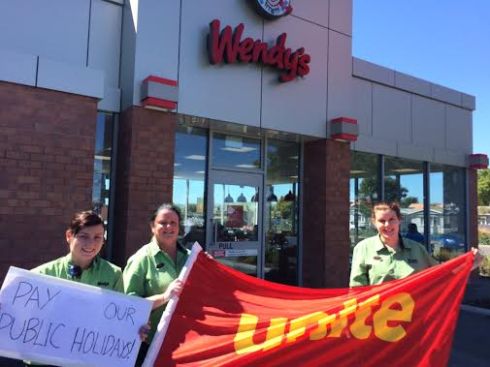
Fast-food workers display signs during a protest to demand regular hiring in Quezon City, Philippines. (AP Photo/Pat Roque)
By Michelle Chen
Reprinted from The Nation
The fast-food workers’ movement has exploded in size and reach over the past year with strikes and protests in dozens of cities. The movement seems to encapsulate rising public disgust not just with the workers’ low wages but with the entire fast-food industry, which runs on an ugly feedback loop of poverty wages, junk diets and commercial exploitation for both consumers and workers. But now the fast-food workers’ campaign has “gone global,” spreading to parts of the world where fast-food logos project a different image, one that ranges from an imperialist corporate hegemony (Manila) to a respectable career (Copenhagen). Now the “Fight for 15” activists are touring different cities to explore how fast food goes down around the world.
In recent days, American fast-food worker activists have embarked on a tour spanning eight countries to share their stories with fellow workers and exchange ideas on organizing locally and globally—mounting a populist challenge to an industry that generates hundreds of billions of dollars worldwide.
Fight for 15 workers from Los Angeles, Albina Ardon and Moses Brooks, have met activists withthe SENTRO union in Manila. The union is organizing a youth-led fast-food worker movement targeting McDonald’s, KFC, and the leading Filipino fast-food chain, Jollibee. The group has called out the “short-term and unprotected work arrangements” prevalent in the industry, particularly the so-called “5-5-5” temp-job system (a model familiar to many American workers), in which “workers are endlessly hired and fired every five months to prevent them from becoming permanent or regular workers.” Aiming to build a national fast-food labor organization, the workers counter the narrative that Westernization via fast-food brands marks a step up for a developing nation. They point instead to the unsavory reality of the global food system, which markets cheap treats to a poor country, to keep their workforce even cheaper.
Continue reading →
Tags: Danish worker, Fastfood worker, Fight for fifteen


 A major survey of fast food workers in New Zealand has
A major survey of fast food workers in New Zealand has







 Gahyun Lee was dismissed from her job at a McDonald’s outlet in Yeokgok, Gyeonggi Province on September 15 following her visit to Los Angeles earlier that month to support the national action by US fast food workers.
Gahyun Lee was dismissed from her job at a McDonald’s outlet in Yeokgok, Gyeonggi Province on September 15 following her visit to Los Angeles earlier that month to support the national action by US fast food workers.






